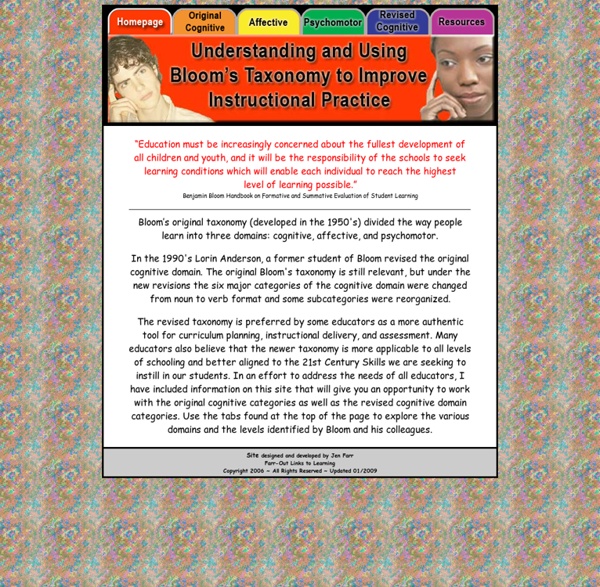Um-bloom-ra Bloom’s Taxonomy
Last week I blogged about my Bloomin’ Peacock, a new Bloom’s Taxonomy visual I made to share with teachers in a training. Over the years, I have created a number of Bloom’s Taxonomy pictures to hang in my classroom for students to refer to. My Bloomin’ Peacock was such a hit with you all, I thought I would start sharing the others I’ve made. Today I revived one that I created for my classroom and added the digital version (again the digital tools displayed relate directly to the Treasures reading curriculum). This is my Um-bloom-ra Bloom’s Taxonomy: …and the digital version: Here are the digital tools included in my taxonomy: Remember: BBC Skillwise- Spelling City- Starfall- Discovery Streaming- Lexipedia- YouTube- Gamegoo- PBS Kids- Understand: Into the Book-
College Readiness: Learning Collaboratively
"Good Morning! You are seated in groups because you will be working together to find real solutions to real problems. You will have to collaborate with your group members to arrive at a solution. Are you ready?" No response. "Ok, your first assignment is to invent a product that fills a real need. No response. Preparing Students The typical first day silence lasted a whole week. When I worked at the University of Texas at San Antonio, I had the privilege of managing this exciting program which used a multi-disciplinary curriculum sponsored by a grant from the Ford Fund called Ford Partnerships for Advanced Studies (PAS). Wisely, the teachers and I anticipated the student lack of preparation for collaboration and decided to spend some time preparing students to function with other students collaboratively, in the inquiry format. Cooperative learning is different than collaborative learning (Webb, Nemer, & Zuniga, 2003). The Results The Implications Suggested resources Dillenbourg, P.
Student Handouts | Free K-12 Educational Materials for Teachers & Students
Critical Thinking On The Web
Top Ten Argument Mapping Tutorials. Six online tutorials in argument mapping, a core requirement for advanced critical thinking.The Skeptic's Dictionary - over 400 definitions and essays. The Fallacy Files by Gary Curtis. Best website on fallacies. What is critical thinking? Nobody said it better than Francis Bacon, back in 1605: For myself, I found that I was fitted for nothing so well as for the study of Truth; as having a mind nimble and versatile enough to catch the resemblances of things … and at the same time steady enough to fix and distinguish their subtler differences; as being gifted by nature with desire to seek, patience to doubt, fondness to meditate, slowness to assert, readiness to consider, carefulness to dispose and set in order; and as being a man that neither affects what is new nor admires what is old, and that hates every kind of imposture. A shorter version is the art of being right. More definitions... Program for Critical Thinking Program for better decision making
NEASC/ 21st Century Skills
::: Cambridge English Online: Learn > Enjoy > Succeed :::
5 Tips and Tools for the Tech Terrified Teacher
By Marisa Kaplan May 24, 2012 11:28 am I left the classroom in September to pursue my interest in education innovation and technology. It saddens me that I had to leave the classroom to pursue these interests but while I was in the classroom, I found myself overloaded with responsibilities. There are two kinds of teachers today, the tech guru and the tech terrified. Rhena shared about how intimidating and overwhelming it was to be in a room full of “techies.” Over the past two years, I have gone through a transformation process. 5 Tips for the Tech Terrified Teacher Remember, it’s not about you! 5 Simple Tech Tools for the Tech Terrified Teacher: A starting point Get a Gmail account! Until we actively start addressing the discomfort that teachers like Rhena feel in the edtech space, we will not be successful in moving our teachers or students into the 21st Century. 1. 2.
25 Best Sites for Free Educational Videos
RefSeek's guide to the 25 best online resources for finding free educational videos. With the exception of BrainPOP and Cosmeo, all listed sites offer their extensive video libraries for free and without registration. Academic Earth Thousands of video lectures from the world's top scholars. academicearth.org Big Think Video interviews with 600+ thought leaders in a range of fields. bigthink.com Brightstorm Short-form online video lessons by professional educators. brightstorm.com CosmoLearning Aggregator of free, online video lessons and documentaries. cosmolearning.com Coursera Lectures taught by world-class professors and reinforced through interactive exercises. coursera.org EdX Courses designed specifically for interactive study via the web. edx.org Futures Channel High quality multimedia content ideal for use in the classroom. thefutureschannel.com Howcast Professional and user-generated how-to videos. www.howcast.com Internet Archive archive.org iTunes U Apple iTunes - Apple iTunes Software Khan Academy Hulu
Partnership for 21st Century Skills
NEA is a founding member of the Partnership for 21st Century Skills, a national advocacy organization that encourages schools, districts, and states to infuse technology into education -- and provides tools and resources to facilitate that effort. The six elements of 21st century learning are: Emphasize core subjects Emphasize learning skills Use 21st century tools to develop learning skills Teach and learn in a 21st century context Teach and learn new 21st century content Use 21st century assessments that measure core subjects and 21st century skills Resources Developed by the Partnership Route 21: An Interactive Guide to 21st Century Learning - Web tool that provides a one-stop-shop for 21st century skills-related information, resources, and community tools. Related Link Results That Matter: 21st Century Skills and High School Reform - This March 2006 report from The Partnership for 21st Century Skills presents three fundamental ideas about high school reform.



